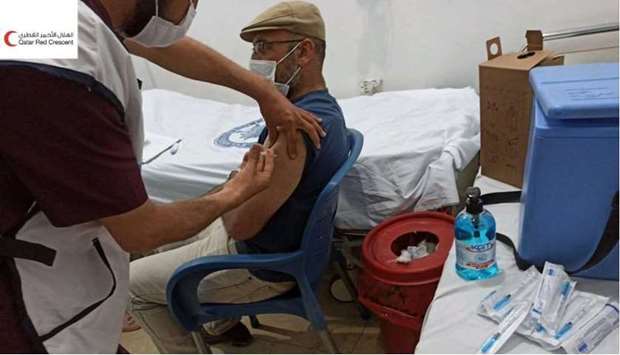Under its neutral vaccination monitoring programme in Syria, Qatar Red Crescent Society (QRCS) has started the monitoring of Phase 1 of the World Health Organisation’s (WHO) Covid-19 vaccination campaign in northern Syria.
This comes as part of the Covid-19 Vaccines Global Access (Covax), a worldwide initiative aimed at equitable access to Covid-19 vaccines.
Early in May, the Syria Vaccination Team initiated the campaign in the Aleppo countryside, Idlib and its countryside. Phase 1 involved giving the first dose of the AstraZeneca Covid-19 vaccine to health and humanitarian professionals in the northern part of the country. This 25-day phase targets to cover 53,000 health and relief workers in 82 facilities.
As a neutral organisation, QRCS seeks to ensure compliance with international vaccination standards. In co-ordination with WHO, 30 well-trained field inspectors are deployed across the designated areas to enforce the campaign’s quality indicators, verify the readiness of vaccination centres, supervise the validity of injections and personnel performance, and make sure that no one is left behind, QRCS has said in a statement.
Other tasks of the monitoring teams include correcting any procedures that go beyond the campaign’s plan, applying coronavirus preventive measures, identifying coverage rates during and after the campaign, and providing recommendations for the vaccinators.
Typically, the monitoring process involves two phases. Prior to a campaign, the supervisers visit the main centres to make sure that all preparations and equipment are in place. Then, vaccine samples and storage conditions are checked for any inconveniences. The inspectors accompany the vaccinators to evaluate their performance at health centres and households. Finally, the results are reported to see what went right and what did not, as feedback to guide future operations.
The first Covid-19 infection in northern Syria was reported in August 2020, and the first wave reached its peak in November. Until May 5, 2021, the total number of confirmed cases is 21,995, including 655 deaths, according to the statistics of WHO and the UN Health Cluster in Gaziantep, Turkey.
QRCS has extensive experience in monitoring vaccination campaigns against infectious diseases. Its representation mission in Gaziantep held brief training courses for the inspectors both on the mission’s premises and inside Syria, to qualify them to perform inspections, develop action plans, follow up with the work done and document all results properly. Then, they become ready to be deployed together with the vaccinators to the target districts.
Over the past seven years, QRCS has monitored numerous vaccination campaigns in Syria in co-operation with many UN, local and international humanitarian organisations. It is a leading organisation in this field, with its remarkable field, administrative and technical expertise.
Early in May, the Syria Vaccination Team initiated the campaign in the Aleppo countryside, Idlib and its countryside. Phase 1 involved giving the first dose of the AstraZeneca Covid-19 vaccine to health and humanitarian professionals in the northern part of the country. This 25-day phase targets to cover 53,000 health and relief workers in 82 facilities.
As a neutral organisation, QRCS seeks to ensure compliance with international vaccination standards. In co-ordination with WHO, 30 well-trained field inspectors are deployed across the designated areas to enforce the campaign’s quality indicators, verify the readiness of vaccination centres, supervise the validity of injections and personnel performance, and make sure that no one is left behind, QRCS has said in a statement.
Other tasks of the monitoring teams include correcting any procedures that go beyond the campaign’s plan, applying coronavirus preventive measures, identifying coverage rates during and after the campaign, and providing recommendations for the vaccinators.
Typically, the monitoring process involves two phases. Prior to a campaign, the supervisers visit the main centres to make sure that all preparations and equipment are in place. Then, vaccine samples and storage conditions are checked for any inconveniences. The inspectors accompany the vaccinators to evaluate their performance at health centres and households. Finally, the results are reported to see what went right and what did not, as feedback to guide future operations.
The first Covid-19 infection in northern Syria was reported in August 2020, and the first wave reached its peak in November. Until May 5, 2021, the total number of confirmed cases is 21,995, including 655 deaths, according to the statistics of WHO and the UN Health Cluster in Gaziantep, Turkey.
QRCS has extensive experience in monitoring vaccination campaigns against infectious diseases. Its representation mission in Gaziantep held brief training courses for the inspectors both on the mission’s premises and inside Syria, to qualify them to perform inspections, develop action plans, follow up with the work done and document all results properly. Then, they become ready to be deployed together with the vaccinators to the target districts.
Over the past seven years, QRCS has monitored numerous vaccination campaigns in Syria in co-operation with many UN, local and international humanitarian organisations. It is a leading organisation in this field, with its remarkable field, administrative and technical expertise.

